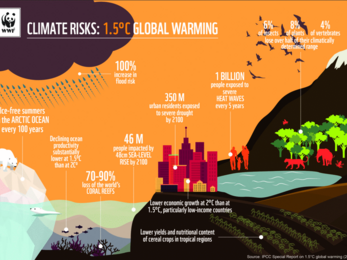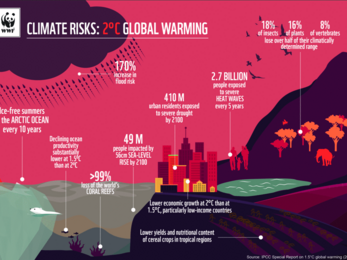The climate crisis and climate change are catch-all terms for the shift in our worldwide climate (long term patterns of weather) associated with an increase in global average temperatures (global warming or heating) due to human activities.
Our planet is warmer now than at any point in the past 1,000 years, and heating fast. This is mainly a result of the huge increase in the amount of coal, oil and gas we’ve been burning since the industrial revolution, pumping greenhouse gases like carbon dioxide and methane into the atmosphere. Other things contribute too, such as deforestation and the destruction of ecosystems, which means trees and habitats cannot absorb as much carbon dioxide.
The climate has now warmed to around 1°C above pre-industrial levels when we first started burning fossil fuels. While this temperature increase is more specifically referred to as global heating or warming, the climate crisis explicitly includes not only Earth's increasing global average temperature, but also the knock-on effects caused by this increase, such as heatwaves, droughts, wildfires, floods, hurricanes, sea level rise, ocean acidification and biodiversity collapse.
In 2018, the Intergovernmental Panel on Climate Change special report ‘Global Warming of 1.5°C’ called on global heating to be limited to 1.5 °C, highlighting the devastating impact a temperature rise of 2°C would have on our food security, water supply, human security and economic growth.
Efforts around the globe are now focused on keeping temperatures from increasing more than 2°C above that pre-industrial average, and ideally no more than 1.5°C. For example, The Paris Agreement is a legally binding international treaty adopted by over 200 countries in 2015. It united all the world's nations - for the first time - in a single agreement on keeping global heating to “well below” 2°C and pursuing efforts to limit it to 1.5°C. That goal may still be possible if the international community pulls together.



